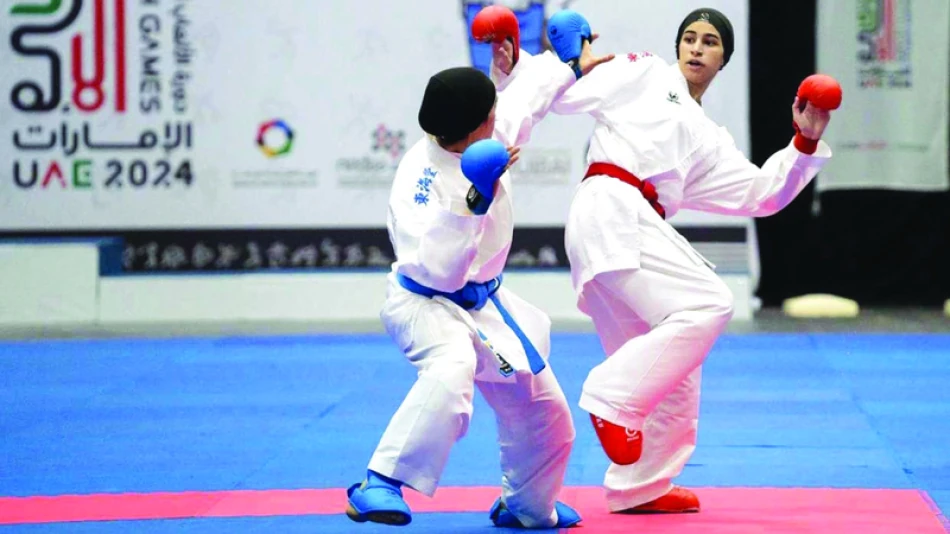
From Football Pitch to Karate Mat: The Rise of a Sporting King
UAE's Teen Karate Champion Malik Al-Hajj Strikes Gold After Academic Hiatus
Seventeen-year-old Malik Al-Hajj has announced her powerful return to competitive karate after a year-long break for high school exams, capturing both gold and bronze medals within eight days at major regional tournaments in Jordan. Her remarkable comeback signals the UAE's growing strength in martial arts and highlights how the nation's sports infrastructure supports young athletes through academic challenges.
Double Medal Triumph in Jordan
Al-Hajj's impressive performance at the Arab Championship and West Asian Championship, held in Amman between August 22-25, demonstrated her versatility across age categories. Competing in the under-48kg kumite division, she first secured bronze in the women's category against older opponents before claiming gold in her own age group at the West Asian tournament.
Currently ranked 36th globally, Al-Hajj's achievements extend beyond these recent victories. Her medal collection includes the 2023 West Asian gold, an Asian bronze from Kazakhstan in 2023, and a Gulf Games gold from Dubai two years prior—making her one of the UAE's most promising martial arts prospects.
Strategic Preparation for Asian Championship
The Jordan tournaments serve as crucial preparation for the upcoming Asian Championship in China, scheduled for September 4th. This strategic competition calendar reflects the UAE's systematic approach to developing world-class athletes, providing multiple high-level exposure opportunities before major continental events.
From Football Fields to Karate Mats
Al-Hajj's athletic journey illustrates the UAE's diverse sports ecosystem. Initially practicing football through specialized academies in 2019, she transitioned to karate in 2021 at her mother's encouragement, joining Al-Ahli Youth Club. This pivot proved transformative—within just one year, she earned selection to the national team in 2022.
Her rapid progression mirrors similar success stories across UAE sports, where strong club infrastructure and national team pathways create clear advancement routes for talented youth. The Al-Ahli Youth Club connection particularly underscores how established sporting institutions serve as talent pipelines for national representation.
Olympic Ambitions and Market Implications
Al-Hajj's ultimate goal centers on Olympic representation, though karate's future in the Games remains uncertain after its exclusion from Paris 2024. Her focus on World League competitions that provide ranking points demonstrates strategic thinking about maintaining global competitiveness regardless of Olympic status.
For the UAE's sports investment landscape, Al-Hajj represents the return on systematic youth development programs. Her success validates the country's approach of combining international coaching expertise with local club structures, creating a model that other Gulf nations are closely watching.
Regional Competition Dynamics
The UAE's performance in martial arts reflects broader regional trends, with Gulf nations increasingly competing for Asian and global recognition in individual sports. Al-Hajj's consistent medal-winning at Arab and West Asian levels positions the UAE favorably against traditional powerhouses like Jordan and Iran in karate.
Her ability to compete successfully in older age categories while dominating her peer group suggests the UAE has identified a potential long-term medal contender. This dual-category success pattern often indicates athletes capable of sustained international competitiveness as they mature.
Academic-Athletic Balance as National Strategy
Al-Hajj's year-long competition hiatus for high school completion, followed by immediate success upon return, demonstrates the UAE's emphasis on holistic athlete development. This approach contrasts with some international models that prioritize sports over education, potentially creating more sustainable career pathways for young athletes.
Her seamless return to elite competition after academic focus suggests robust support systems maintained training quality during her hiatus. This model could influence how other UAE sports federations manage promising young athletes facing similar academic pressures.
Most Viewed News

 Sara Khaled
Sara Khaled






